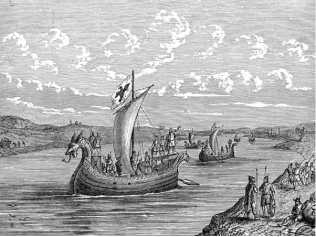The Spanish, Portuguese, and English were not the first Europeans to come to North America. As far as is known, the first to arrive on the continent of North America were from Scandinavia. The Norse explorer Eric the Red traveled through Greenland and founded a

Settlement around the year 985. His son Leif Ericsson also explored the area of what is now Northeastern Canada and spent some time in that region. It is possible that Viking explorers sailed farther south along the Atlantic coast, perhaps as far as the Caribbean islands. Some evidence has been found in North and South America to suggest that other contacts occurred between North America and explorers from either Europe or Asia, but all such ideas remain in the realm of speculation pending further evidence.
In any case, Columbus's journeys, conducted under the auspices of King Ferdinand and Queen Isabella of Spain, traditionally mark the beginning of the period of European settlement of the New World. John Cabot, Amerigo Vespucci, Ponce de Leon and others soon established territorial claims for Spain and Portugal, and Vespucci's name was eventually attached to the continents of the New World. (He probably had a better publicist than Columbus.) But Columbus was the first to arrive after 1400.
The great irony of Christopher Columbus, of course, is that he never really knew what he had discovered; indeed, he never set foot on the continent of North America. Yet the first explorations of the area that eventually became the United States started from the Spanish settlements begun by Columbus in the Caribbean. The oldest settlement in North America is the city of St. Augustine in Florida. Spanish explorers such as Hernando De Soto and Francisco Coronado ventured widely into the southeastern and central parts of North America and as far west as Colorado and the Grand Canyon. It was Coronado's men who introduced the plains Indians to the horse, which, as stated elsewhere, resulted in a remarkable transformation of their culture. Other Europeans such as Giovanni da Verrazano sailed along the east coast as far as New York harbor, and Frenchman Jacques Cartier sailed into the St. Lawrence River, establishing the French claims on what became Canada.




 World History
World History









